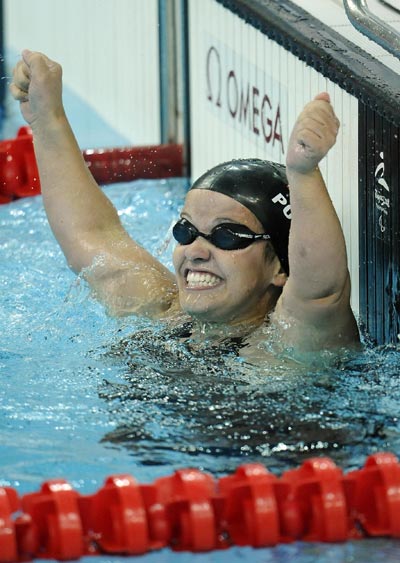It's physical function that set the participants in the Paralympics apart from their counterparts at the Olympics. But that doesn't mean disabled people cannot match the achievement of able-bodied Olympic stars.
U.S. swimmer Erin Popovich, who stands 1.34 meters tall, snared her third gold medal of the Beijing Paralympics Tuesday evening with a world-record time of 1:31.60 in the women's SB7 100m breaststroke.
 |
|
Erin Popovich of the United States wins the gold medal of the SB7 final of Women's 100m Breaststroke. [Xinhua]
|
The 23-year-old is often referred to as "the Paralympic Michael Phelps", but it seems more accurate to pin a nickname on Phelps: "the Olympic Popovich."
In the Athens Olympics in 2004, Phelps came up one short of matching Mark Spitz's 1972 gold medal haul, while Popovich went 7-for-7 in five individual events and two relays in the ensuing Paralympics.
"The best thing about the Paralympic Games is that stereotypes are dispelled," said Popovich. "You see someone in a wheelchair or with a certain disability and instead of dwelling on their problems, you see they are focused on what they can achieve. I'm blown away by their abilities."
Popovich is not an exception at the Paralympics. More than 4,000 disabled athletes from around the world competing here want to be recognized - win or lose - for their sporting achievements.
South African sensation Oscar Pistorius started his quest for three gold medals on a winning note as the double amputee, using a pair of carbon-fiber prosthetic legs, overcame a slow start to win the men's TT44 100m sprint in 11.17 seconds Tuesday night at the Bird's Nest stadium.
Pistorius was born without his fibula, the smaller of the two bones in the lower legs, and when he was 11 months old both limbs were amputated below the knee.